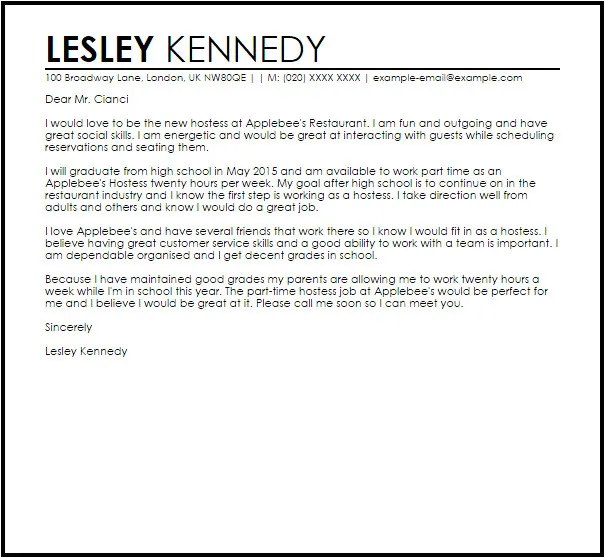Crafting a Compelling Host Cover Letter
A well-crafted host cover letter is your first opportunity to make a positive impression on potential employers. It serves as a crucial tool in your job search arsenal, allowing you to showcase your personality, skills, and enthusiasm for the role. Unlike a resume, a cover letter provides you with the space to tell your story, explain your motivations, and demonstrate how your unique qualifications align with the specific requirements of the host position. This comprehensive guide will walk you through the essential elements of writing a cover letter that grabs attention and significantly increases your chances of getting hired. Following the strategies outlined here will help you create a winning cover letter that will make you stand out.
Understanding the Host Position and Its Requirements
Before you begin writing, it’s essential to fully understand what a host position entails. This understanding will not only help you tailor your cover letter effectively but also demonstrate your awareness of the role to the hiring manager. Researching the specific requirements of the host position is an investment in your time. Carefully review the job description, paying close attention to the key responsibilities, essential skills, and desired qualifications. This will enable you to align your cover letter content and skills directly with what the employer is seeking. Knowing these requirements gives you a significant advantage when crafting your cover letter.
Key Responsibilities of a Host
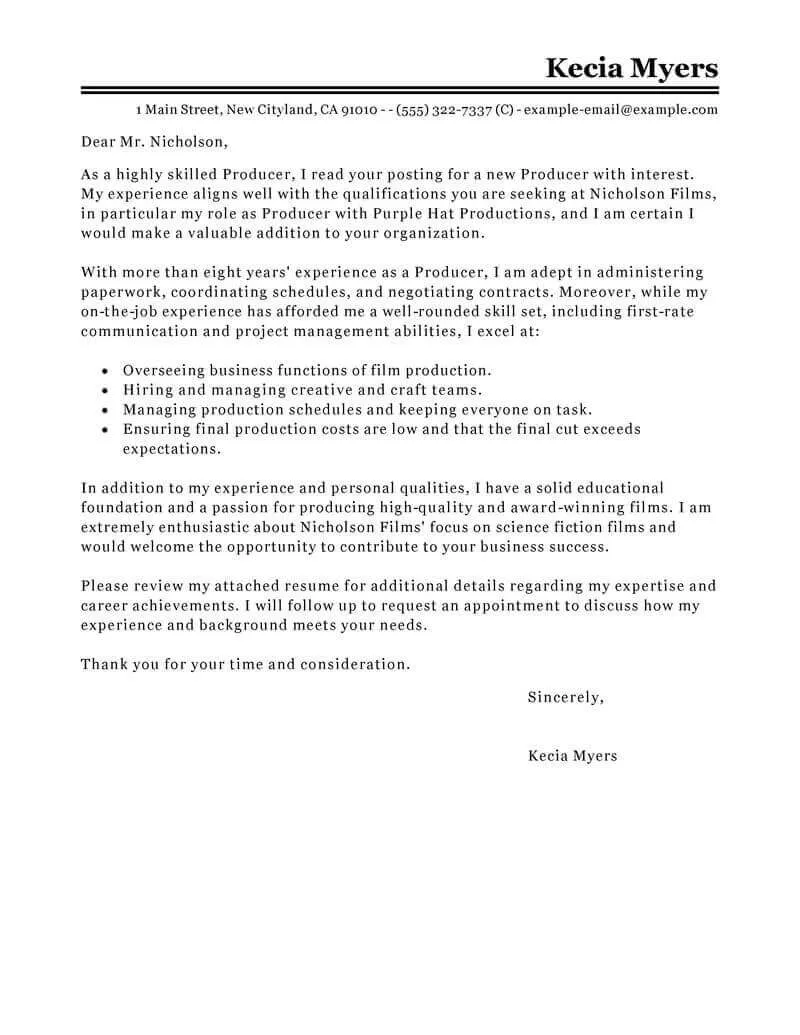
Hosts play a pivotal role in creating a welcoming and positive experience for guests. Key responsibilities often include greeting guests, managing seating arrangements, taking reservations, and assisting with various customer needs. You might also be involved in answering phones, managing wait times, and maintaining the cleanliness of the entrance area. Being aware of these responsibilities, which varies depending on the establishment, helps you highlight your most relevant experience and skills, thereby making your cover letter more compelling. You need to show how you can effectively handle these duties with skill and grace.
Essential Skills for a Successful Host
Beyond specific tasks, certain skills are crucial for success in a host position. Excellent communication skills are essential, as hosts interact with guests regularly. Strong customer service abilities, including empathy and problem-solving skills, are vital for handling guest inquiries and resolving issues. Organizational skills are also important, as hosts often manage seating charts, reservations, and wait times. When crafting your cover letter, be sure to showcase these skills. Mention specific examples of how you have demonstrated these skills in the past, making it clear why you’re the right person for the job. Include clear examples that will demonstrate your suitability.
Formatting Your Host Cover Letter
Proper formatting is vital for presenting your cover letter in a professional and readable manner. A well-formatted cover letter is easy to read and makes a positive first impression. Using a clean and consistent layout helps you communicate your key skills and experience effectively. It demonstrates attention to detail, something that all employers want to see in their potential employees. The following sections will help you structure your cover letter so it’s easy to read and will stand out from the crowd.
Contact Information and Date
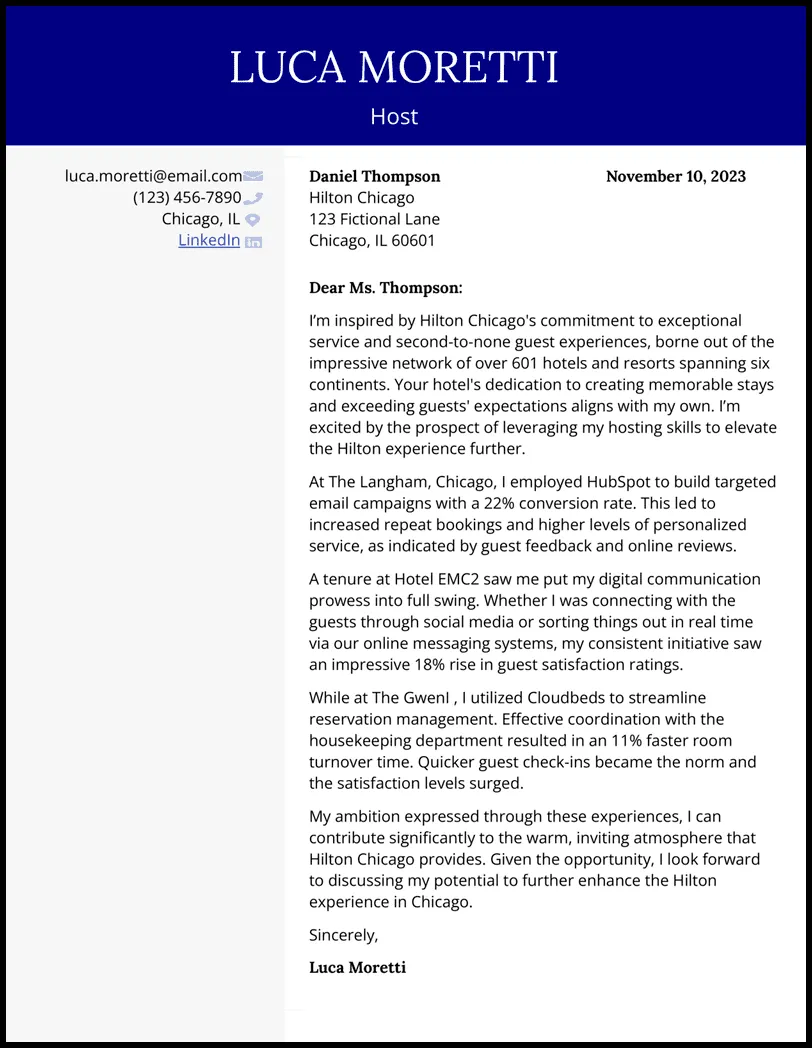
Start your cover letter by including your contact information in the upper left-hand corner. This should include your full name, address, phone number, and email address. Directly below your contact information, include the date. This information is vital for the hiring manager to contact you. It is standard practice for any job application letter, and it ensures that the person can easily reach you when they are interested in inviting you for an interview. Ensure this information is accurate and up to date to avoid any communication issues.
Recipient’s Information
Directly beneath the date, on the left or centered, include the recipient’s information. This typically includes the hiring manager’s name (if known), title, and the company’s address. Whenever possible, address your cover letter to a specific person. If you don’t know the hiring manager’s name, you can usually find this information by researching the company’s website or LinkedIn profiles. Addressing the letter to a specific person demonstrates your initiative and personalized attention, which can make a great first impression. It can increase your chances of being considered for the role.
Professional Salutation
Use a professional salutation to begin your cover letter. ‘Dear Mr./Ms./Mx. [Last Name]’ is the standard, formal greeting. If you don’t know the hiring manager’s name, use a general greeting such as ‘Dear Hiring Manager.’ Avoid overly casual salutations like ‘Hi’ or ‘Hello.’ A professional salutation sets a tone of respect and shows you take the application process seriously. It’s a small detail, but it can make a positive impact on the person who will be reading your letter. Be sure to use the correct title and spelling when addressing the hiring manager to show your attention to detail.
Writing a Strong Opening Paragraph
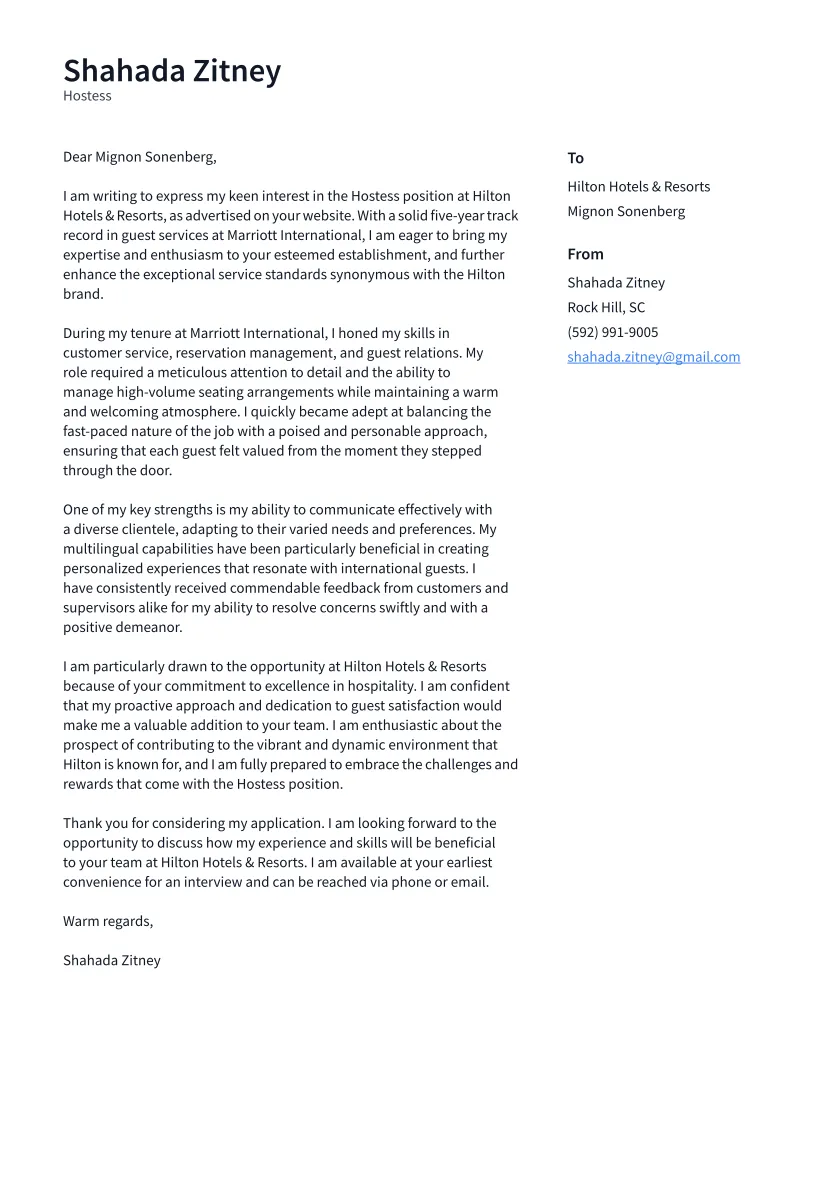
The opening paragraph of your cover letter is crucial because it’s your first chance to grab the reader’s attention. It should be concise, engaging, and immediately communicate your interest in the host position. Start by clearly stating the position you’re applying for and how you learned about the opportunity. This helps the reader quickly understand the purpose of your letter. Then, express your enthusiasm for the role and the company. This should be a strong introduction and gives the reader a reason to continue reading your letter. You can highlight your strongest skills and experience. Making the opening paragraph compelling is key to getting your cover letter read.
Highlighting Your Enthusiasm and Interest
Expressing genuine enthusiasm for the host position and the company is essential. This shows that you’re not just looking for any job but that you are truly interested in this specific opportunity. Clearly articulate your passion for customer service, hospitality, and the company’s values. Tailor your expressions to the specific establishment. Mention something specific that attracts you to their business, such as their positive reputation, their service, or their unique atmosphere. Your enthusiasm can set you apart from other candidates, showing the hiring manager that you’re truly motivated to join their team. It also sets a positive tone for the rest of your cover letter.
Mentioning Where You Found the Job Posting
In your opening paragraph, be sure to mention where you found the job posting. This is a standard practice that helps the hiring manager track the effectiveness of their recruitment efforts. It also shows that you’ve paid attention to the details of the job application process. State the source, whether it’s a specific job board, the company’s website, or a referral from a current employee. It also helps the hiring manager to know you are addressing the role and not just sending out mass applications. This information may be particularly important if there is a referral involved.
Showcasing Your Relevant Skills and Experience
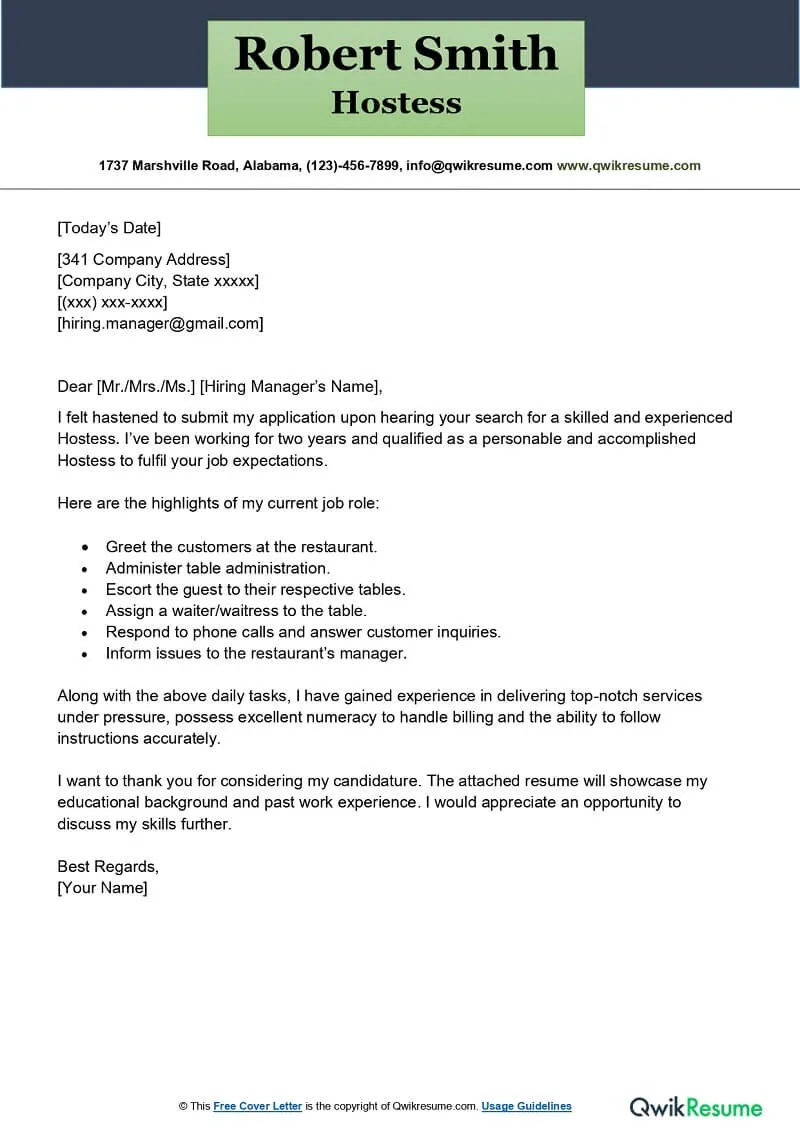
The body of your cover letter is where you showcase your relevant skills and experience. Focus on how your qualifications align with the specific requirements outlined in the job description. Use specific examples to demonstrate your abilities and the impact you’ve made in previous roles. Provide details and use strong action verbs to describe your responsibilities and achievements. The goal is to create a clear and compelling narrative that makes a strong case for why you’re the perfect fit for the host position. Show your capabilities in each area, so the hiring manager can have a clear understanding of your abilities.
Demonstrating Excellent Communication Skills
Excellent communication skills are paramount for a host. Highlight your ability to communicate clearly, effectively, and professionally. Mention your experience in interacting with guests, handling inquiries, and resolving issues. Provide examples of how you’ve used your communication skills to create positive guest experiences. Demonstrate your ability to listen actively, understand guest needs, and respond appropriately. You can show these capabilities by using specific examples from previous roles. These examples will create a compelling narrative.
Highlighting Customer Service Abilities
Customer service is the heart of the host role. Emphasize your customer service abilities by showcasing your skills in providing excellent service and creating a welcoming atmosphere. Provide specific examples of how you’ve exceeded customer expectations in previous roles. Mention your ability to handle complaints, address concerns, and go the extra mile to ensure guest satisfaction. Show how you create a positive experience. You can also highlight any training or certifications you have received. These details will help you stand out.
Emphasizing Organizational Skills and Multitasking
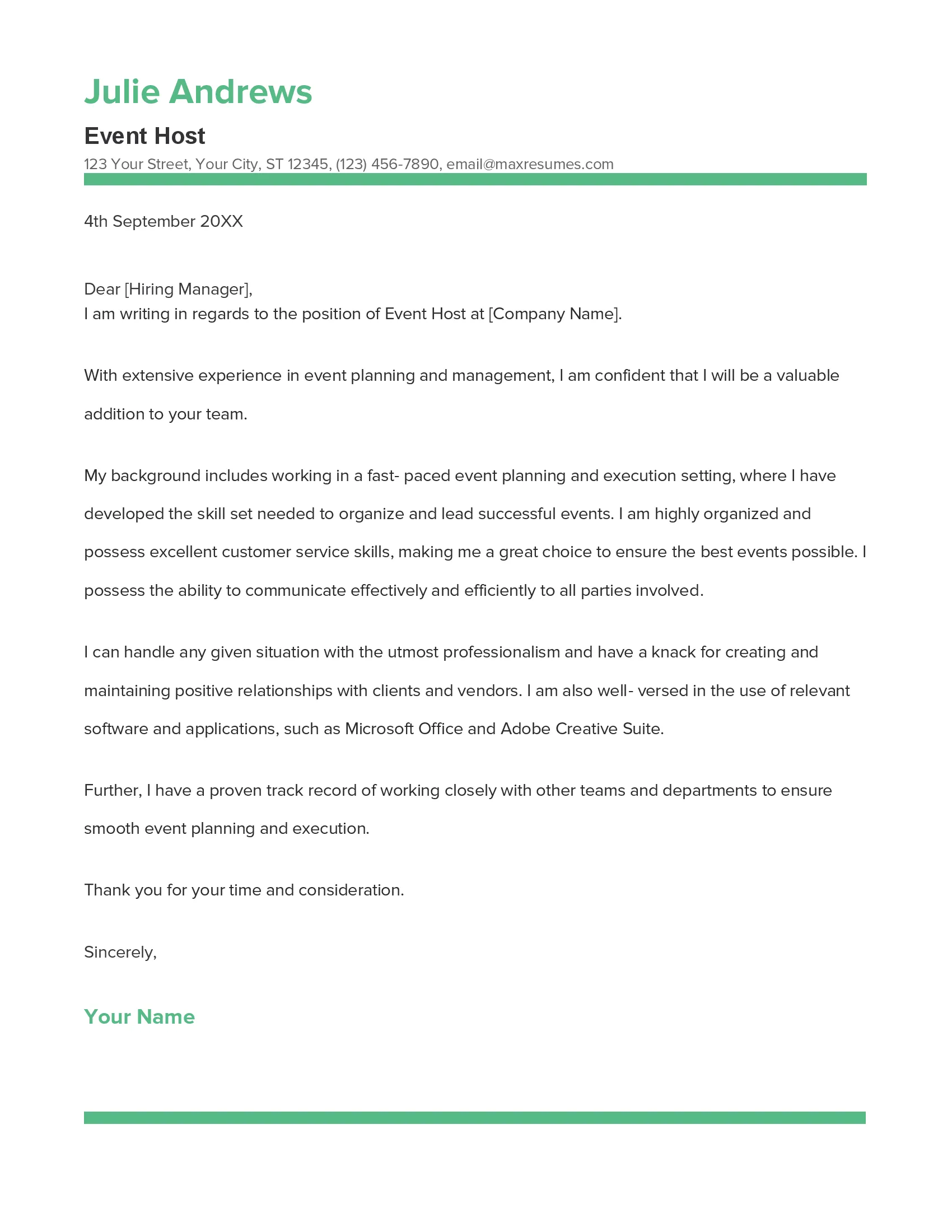
Hosts must juggle multiple tasks. Therefore, highlight your organizational and multitasking skills. These skills help to manage seating arrangements, reservations, and wait times. Provide examples of how you’ve efficiently managed multiple responsibilities simultaneously. Mention your experience with reservation systems, handling phone calls, and coordinating guest needs. Use specific examples to illustrate your ability to stay organized, prioritize tasks, and remain calm under pressure. Emphasize your ability to keep everything running smoothly. This can enhance your suitability for the role.
Quantifying Your Achievements
Whenever possible, quantify your achievements to make your cover letter more impactful. Providing concrete data and numbers gives the hiring manager a clear understanding of your accomplishments and the value you can bring to the company. Quantifiable achievements are often more convincing than vague statements. They help the hiring manager quickly understand your impact. Consider all the possibilities to make your points come across clearly.
Providing Specific Examples
Instead of making general statements about your skills, provide specific examples that demonstrate your ability to excel in the host position. Describe a situation where you successfully resolved a guest complaint, managed a busy service period efficiently, or implemented a new organizational system. Explain the actions you took, the challenges you faced, and the positive outcomes you achieved. Use the STAR method (Situation, Task, Action, Result) to structure your examples for maximum impact. Specific examples make your cover letter more memorable. They show how you can use your skills to contribute.
Using Numbers and Data
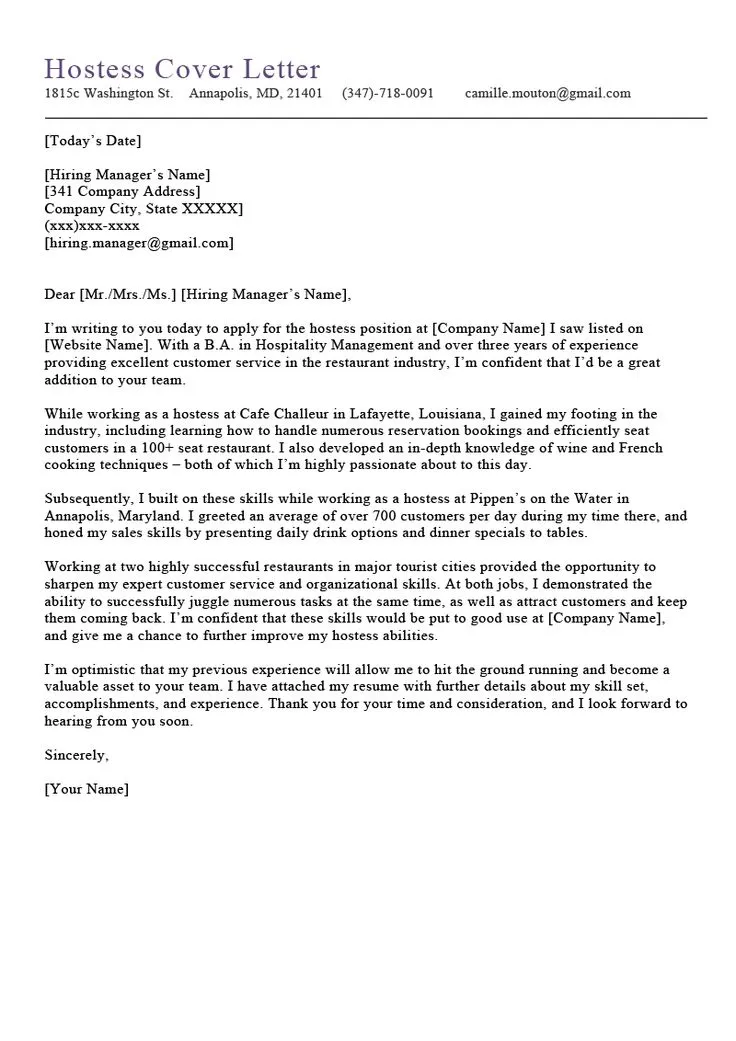
Incorporate numbers and data to quantify your achievements. For example, instead of saying you ‘improved customer satisfaction,’ state that you ‘increased customer satisfaction scores by 15% through improved service.’ Or, instead of saying you ‘managed reservations efficiently,’ state that you ‘processed an average of 50 reservations per day with 100% accuracy.’ Numbers and data provide concrete evidence of your capabilities and the value you brought to previous roles. Numbers also make your cover letter more credible. They provide an undeniable measure of success. When providing data, ensure your numbers are easy to understand.
Closing Your Cover Letter Effectively
The closing of your cover letter is your final opportunity to make a lasting impression. It should be professional, express your interest in the position, and prompt the hiring manager to take action. A strong closing ensures that your cover letter ends on a positive note. It also increases your chances of being invited for an interview. It is a critical moment in your job application, so be sure to take the time to craft the perfect close.
Expressing Your Interest in an Interview
In your closing paragraph, clearly express your interest in an interview. State that you’re eager to discuss your qualifications further and learn more about the opportunity. Show your excitement to potentially join the team. Make it easy for the hiring manager to envision you in the role. You want them to see how you will fit in. End with a call to action. This helps the hiring manager know the next steps. This encourages them to contact you. A clear statement of your interest can significantly increase your chances of being called for an interview.
Thanking the Hiring Manager
Always thank the hiring manager for their time and consideration. This shows respect and professionalism. A simple thank you can go a long way in creating a positive impression. It also shows you appreciate the effort they put into reading your cover letter. This gesture also shows you are polite and courteous. You can also reiterate your enthusiasm for the role. A sincere thank you demonstrates your gratitude and consideration, making a positive closing impression. It’s also good to include the name to make the communication more personal and respectful.
Professional Closing and Signature
End your cover letter with a professional closing, such as ‘Sincerely,’ ‘Best regards,’ or ‘Thank you.’ Leave space for your signature (if submitting a physical copy) and type your full name below. Using a professional closing and signature gives your cover letter a polished and credible appearance. It demonstrates your attention to detail. Ensure your name is clearly legible and that you have included your full name. It is important to show that you care and want to present yourself in the best light. Your closing reflects your professionalism and respect for the hiring process.
Proofreading and Editing Your Host Cover Letter
Before submitting your host cover letter, proofread and edit it meticulously. Errors in grammar, spelling, and punctuation can detract from your message and create a negative impression. Take the time to review your cover letter carefully. Proofreading helps ensure that your letter is polished, professional, and free of any mistakes. You can also have a friend, family member, or career counselor review your letter. They will give you an unbiased opinion. Proofreading is an essential step that shows the hiring manager that you pay attention to detail.
